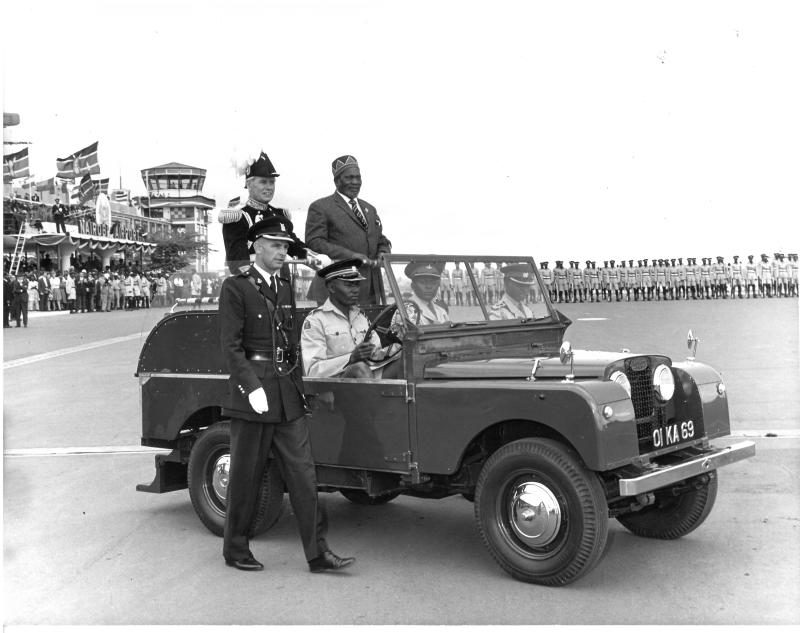But the most hilarious thing was that Kenyans had not been taught the words of the new national anthem
By Undercover Reporter
@Undercover KE
Kenya attained her independence this week on December 12, 1963-when one in three citizens lived in round mud walled huts. The country had only three African lawyers and 100 telephone landlines, mostly in government offices.
There were many sideshows to the Independence Day Celebrations. For starters, the Kenya Red Cross had a temporary maternity ward at Lang’ara Barracks where five mothers delivered ‘Uhuru Babies’!
The Celebrations were almost ruined by heavy rains and Uhuru Gardens then having been hived off a hill side was a mess made worse by the over 200, 000 Kenyans who trooped there, mudding the venue further, according Clyde Sanger’s 1995 biography, Malcom MacDonald: Bringing End to Empire.
The event was also delayed after the limo carrying Kenyatta, and the Duke of Edinburgh got stuck in the mud: they arrived 30 minutes late! So muddy was the venue Uganda’s then Prime Minister Milton Obote abandoned his car in the stadium…and walked to the ceremonial dais.
Cheering crowd resulted to singing the more familiar word of the future East Africa Federation “Kenya, Uganda, Ugunja, Tanganyika, sisi twa saidiana”
There were other Uhuru celebration activities around the country: a canoe race in Lake Victoria, dhow competitions in Lamu where the owner of Petley’s Hotel sponsored the fire works and a resident donated a generator for the trooping of national colours that lit the water front.
But the most hilarious thing was that Kenyans had not been taught the words of the new national anthem which had been selected from three samples played by the military band after which over 600 children assembled in Kenyatta’s Gatundu home chose by a show of hands what is today our national anthem.
Nevertheless those in attendance were supposed to sing as the Union Jack went down and Kenya’s flag went up. In the end, the cheering crowd resulted to singing the more familiar word of the future East Africa Federation “Kenya, Uganda, Ugunja, Tanganyika, sisi twa saidiana.”
But before the event at Uhuru Gardens, the celebrations were preceded by a State Ball at City Hall, a Garden Party at Government House (now State House), religious services, Parliamentary ceremonies, cultural events, bands, youth rallies, films, Tattoo and Forces Arena shows and dancers providing a “bewildering variety of colour and movement”.
Colonial Secretary Duncan Sandys had toyed with the idea of delaying our independence
Colonial Secretary Duncan Sandys had toyed with the idea of delaying our independence but MacDonald, who suffered a weak heart and pneumonia, fast trucked it with one year arguing Kenyans were as “capable of taking over today as they will be in two years hence.”
This is how foreign guests were drawn: “Each Cabinet minister,” wrote Horner, “would be asked to submit… a list of not more than 10 names of individuals considered worthy of invitation as Honoured Guests of Kenya, giving reasons for each nomination…. also, indicate whether any of the persons should be accompanied by (their) wives.”
For local guests, Horner asked the Permanent Secretaries to “submit 50 names to include wives and dependants where appropriate,” and all senior staff “will be required at the airport to meet guests of the government coming from abroad on a 24-hour basis.”
H L Bennet, Chief Supplies Officer, Ministry of Works, asked all ministers to “mark their chairs with an identification mark so as to ensure that chairs were correctly returned to ministries concerned after the celebrations.
Among the eight Kenyan couples invited in their ‘private capacities’ included; Mr & Mrs J.M. Waiyaki and Mr and Mrs S.M. Otieno. James Mugo Waiyaki was later a High Court Judge and was brother to Wambui Otieno, the fire brand activist wife of criminal lawyer SM Otieno-and whose death in December 1986 sparked off what remains a landmark burial court dispute since independence.

